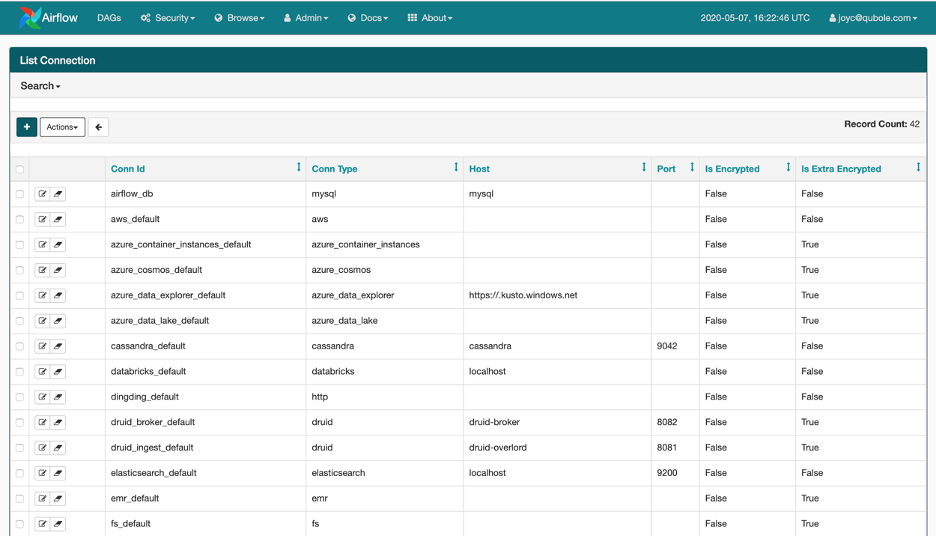Airflow template variables are a powerful feature that allows dynamic parameterization of tasks within dags. They are simply objects consisting of a key and a json serialiasable value, stored in airflow’s metadata database. And what if your code uses tokens or other type of secrets? In apache airflow, the grpc_operator.grpcoperator is a useful tool for making grpc calls within your directed acyclic graphs (dags). This field takes a list of python packages that may need to be installed to run the code in the task.
The most commonly used are: Syntactically, variables inserted at runtime are denoted in your code with double curly braces. You can use jinja templating with every parameter that is marked as “templated” in the documentation. S3_bucket = '{{ var.value.bucket_name }}'. Var.value.get('my.var', 'fallback') but in running that on version 1.10.6,.
The most commonly used are: Variables are a generic way to store and retrieve arbitrary content or settings as a simple key value store within airflow. According to the official docs if you want to use jinja to fetch a variable and provide a default value, the syntax is: This field takes a list of python packages that may need to be installed to run the code in the task. In the following example, a function is added to the dag to print the.
Apache airflow's template fields enable dynamic parameterization of tasks, allowing for flexible and scalable workflow design. Short answer, ds and macros variables can only be accessed through template as they only exists during execution and not during python code parsing (when the dag is loaded by airflow). Here are some of the most commonly used: If you use json, you are also able to walk nested structures, such as dictionaries like: To use them, just import and call get on the variable model: The var template variable allows you to access variables defined in airflow’s ui. If you use json, you are also able to walk nested structures, such as dictionaries like: $ airflow variables set 'my_key' 'my_value' to use a variable within a dag, you can retrieve it using the variable.get method: These variables leverage the jinja templating engine, enabling the injection of code, variables, or file paths into airflow tasks at runtime. In apache airflow, the grpc_operator.grpcoperator is a useful tool for making grpc calls within your directed acyclic graphs (dags). They are simply objects consisting of a key and a json serialiasable value, stored in airflow’s metadata database. I know that you can pass templated variables as string into operators, but i'd like to pass them around as their actual type. Variables are a generic way to store and retrieve arbitrary content or settings as a simple key value store within airflow. This field takes a list of python packages that may need to be installed to run the code in the task. It makes sense that specific parameters in the airflow world (such as certain parameters to pythonoperator) get templated by airflow automatically.
The Most Commonly Used Are:
S3_bucket = '{{ var.value.bucket_name }}'. Templating or “jinja templating” means that you will fill in variables at runtime. You can use jinja templating with every parameter that is marked as “templated” in the documentation. Airflow brings many variables and macros you can use in your templates.
These Variables Leverage The Jinja Templating Engine, Enabling The Injection Of Code, Variables, Or File Paths Into Airflow Tasks At Runtime.
I would like to be able to pass that list via a. S3_bucket = variable.get('bucket_name') it works but i'm being asked to not use the variable module and use jinja templating instead (i.e.): They are simply objects consisting of a key and a json serialiasable value, stored in airflow’s metadata database. To use them, just import and call get on the variable model:
Here Is Where We Can Find The Current And Deprecated Airflow Template Variables.
Airflow provides a convenient way to inject these into the jinja environment. According to the official docs if you want to use jinja to fetch a variable and provide a default value, the syntax is: If you use json, you are also able to walk nested structures, such as dictionaries like: Var.value.get('my.var', 'fallback') but in running that on version 1.10.6,.
$ Airflow Variables Set 'My_Key' 'My_Value' To Use A Variable Within A Dag, You Can Retrieve It Using The Variable.get Method:
Airflow variables are simple yet valuable construct, used to prevent redundant declarations across multiple dags. In apache airflow, the grpc_operator.grpcoperator is a useful tool for making grpc calls within your directed acyclic graphs (dags). Syntactically, variables inserted at runtime are denoted in your code with double curly braces. If you use json, you are also able to walk nested structures, such as dictionaries like:






![Airflow Template Macros [UPD]](https://assets.kit.co/kits/2a/76/airflow-template-macros-upd-2a76add9a9baef71f90ed3b4bac6ce75.jpg)

